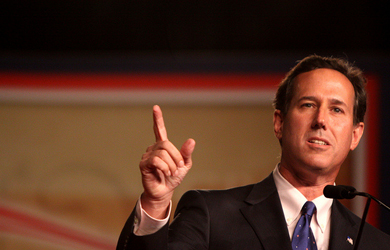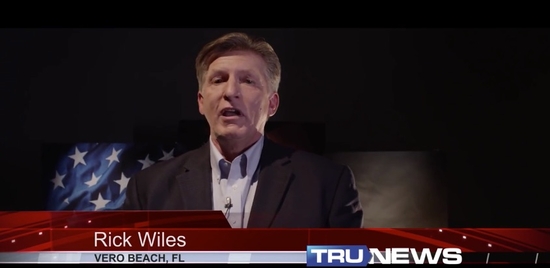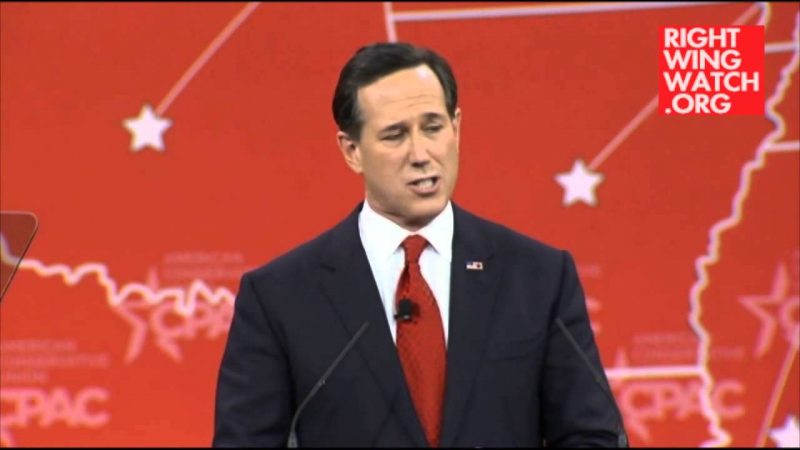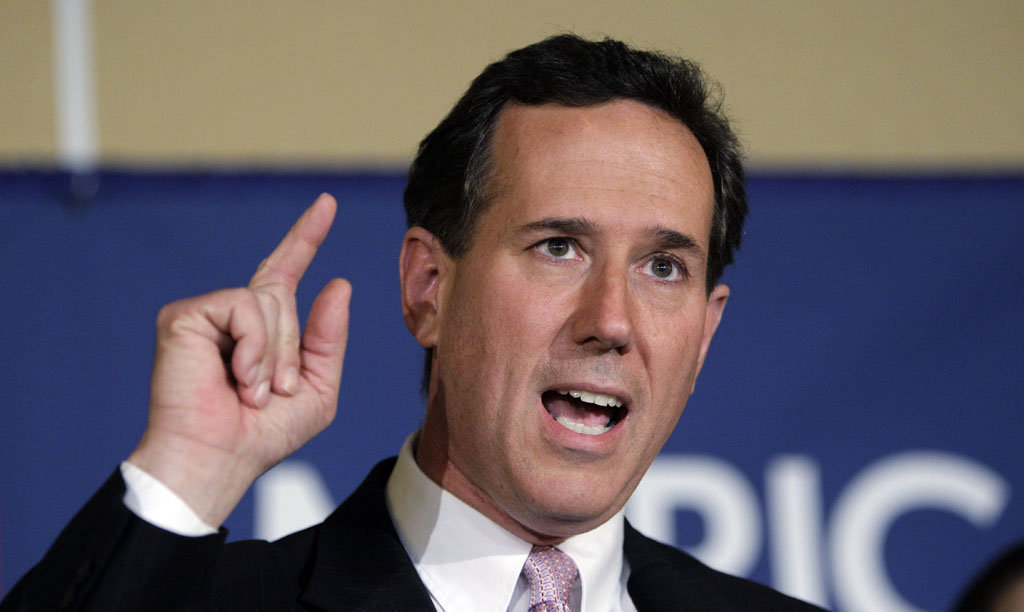Two current Religious Right fixations — the “persecution” of American Christians and the need for conservatives to do more to influence the pop culture — have come together in movies like “Persecuted” and “We the People—Under Attack.” The latest entry, “One Generation Away: The Erosion of Religious Liberty,” was screened by Rick Santorum at the Heritage Foundation on Monday night.
Santorum said the movie will be released in September. His EchoLight Cinemas is trying to create an alternative to Hollywood distribution channels by building a network of thousands of tech-equipped churches who will sell tickets for “One Generation Away” and other movies. He says the long-term strategy is to bring more people into churches and put the church back at the center of the culture.
“One Generation Away” is described as a documentary, but it’s really a preaching-to-the-choir call to arms for conservative Christians and pastors to get more involved in culture war battles while they still have the freedom to do so. Among the film’s producers are Donald and Tim Wildmon from the American Family Association, which Santorum said is packaging a shorter version of the movie into more of an activist tool.
The title comes from Ronald Reagan – specifically from a speech to the Phoenix Chamber of Commerce in 1961, a time in which Reagan was working with conservatives to rally opposition to Medicare – “socialized medicine”:
Freedom is never more than one generation away from extinction. We didn’t pass it on to our children in the bloodstream. It must be fought for, protected, and handed on for them to do the same, or one day we will spend our sunset years telling our children and our children’s children what it was once like in the United States where men were free.
The thrust of “One Generation Away” is that religious freedom in the United States is disappearing fast, and if the church doesn’t fight for it now, it will soon be gone forever. Before running the film on Monday, Santorum quoted Cardinal Francis George, who said during the debate about insurance coverage of contraception, “I expect to die in my bed. I expect my successor to die in prison. I expect his successor to be a martyr.” That’s just the kind of hyperbolic “religious persecution” rhetoric we have come to expect from Religious Right leaders and their allies in the Catholic hierarchy.
At one point toward the end of the movie, it seems as if the filmmakers might be striking a more reasonable tone, with a couple of speakers saying that Christians should stand up for the rights of people of different faiths — even though the AFA’s chief spokesman opposes First Amendment protections for non-Christians— and others actually acknowledging that it is problematic for American Christians to be complaining of “religious persecution” over policy disputes when Christians and others are facing horrific, deadly persecution in many other parts of the world.
But that caution is quickly abandoned as the movie makes a direct comparison of the status of the Christian church in America with the church in Germany as the Nazis came to power. Dietrich Bonhoeffer, a pastor who tried to mobilize German Christians to resist Nazi tyranny and was executed by the regime, is held up as the model that American Christians need to be willing to follow.
Eric Metaxas, a Bonhoeffer biographer who became a Religious Right folk hero when he questioned President Obama’s faith at a National Prayer Breakfast attended by the president, warned that if the church doesn’t link arms to fight, all will be lost. “The good news,” he said, “is that the American church is slightly more attuned to the rumbling heard in the distance than the German church was in the 30s. The bad news is, only slightly, right?”
The movie cuts to Mike Huckabee saying that Bonhoeffer could have saved his life if he had been willing to soften his faith, but that instead he resisted and rebuked the Nazi regime. And then we’re back to Metaxas to complete the Nazi analogy:
“The parallel today is simply that. You have a government, a state, which is getting larger and larger and more and more powerful, and is beginning to push against the church. There’s a window of opportunity where we can fight. If we don’t wake up and fight before then, we won’t be able to fight. That’s just what happened in Germany. And that’s the urgency we have in America now. And people that’s incendiary, or I’m being hyperbolic. I’m sorry, I wish, I wish, I wish I were. I’m not.”
Filmmakers said at the screening that they had conducted 75 interviews for the movie, and it sure feels like it. It includes names that will be well-known to RWW readers, like Mike Huckabee, Tony Perkins, Harry Jackson, Tim Wildmon, Alveda King, Robert George, Russell Moore of the Southern Baptist Convention, Eric Teetsel of the Manhattan Declaration, and Ryan Anderson and Jennifer Marshall of the Heritage Foundation.
Also appearing are Rep. Doug Collins; Rick Perry backer Robert Jeffress; Matthew Franck of the Witherspoon Institute, which sponsored the infamous and discredited Regnerus “family structures” study; Stephen McDowell of the dominionist Providence Foundation; Gregory Thornbury of Kings College; lawyers from the Alliance Defense Fund, the Beckett Fund, the Freedom of Conscience Defense Fund; and a number of pastors.
The film also includes interviews with some opponents of the Religious Right, including Barry Lynn of Americans United for Separation of Church and State, Princeton’s Peter Singer, and Dan Barker of the Freedom From Religion Foundation. Santorum told the audience at Heritage that he wishes he had even more of his opponents included in the film because “they scare the hell out of me” and would help motivate the right-wing base.
In order to keep the movie from being one brutally long succession of talking heads, the filmmakers resort to a tactic of constantly shifting scenes, a couple of seconds at a time, in a way that feels like they got a volume discount on stock images of Americana: boats on the water, kids playing softball, families walking together. There are also odd random fillers, like close-ups of the pattern on a couch in the room in which a speaker is sitting. The endless, repetitive succession of images actually makes the film feel even longer than it actually is. (Zack Ford at ThinkProgress had a similar reaction to this technique.)
The meat of the film, or the “red meat,” mixes the personal stories of people being victimized by intolerant secularists and/or gay activists with miniature David Bartonesque lectures on the Christian roots of America’s founding; the fact that the phrase “separation of church and state” never appears in the U.S. Constitution; the notion that the American government is trying to replace “freedom of religion” with “freedom of worship” and require any expression of faith to take place behind church walls; and the disgracefulness of making any analogies between the civil rights movement and the LGBT equality movement. The 1947 Supreme Court decision in which Jefferson’s “separation of church and state” phrase was invoked by the Court and “changed everything” is portrayed as nothing more than a reflection of Justice Hugo Black’s hatred of Catholics.
Featured “persecution” stories include:
- a long advertisement for Hobby Lobby and its owners, the Green family, which recently won its legal battle against the contraception mandate;
- a baker and florist who ran afoul of their state’s anti-discrimination laws when they refused to provide services for a same-sex couple getting married;
- cheerleaders at a public high school in Texas who were challenged by the Freedom From Religion Foundation for creating football game banners featuring Christian scriptural quotes;
- Catholic Charities being “forced” to give up adoption services rather than place children with same-sex couples;
- an ACLU challenge to a large cross at the Mt. Soledad war memorial; and
- the supposed frontal attack on the religious freedom of military chaplains as a result of allowing LGBT members of the armed forces to serve openly. On this issue, Tony Perkins declares, “The military is being used as a vanguard of radical social policy. And in order for that policy to permeate and to take root, you’ve got to take out the religious opposition.”
In spite of the parade of horrors, the movie tries to end on an upbeat note, saying that the early Christian church expanded while it was being suppressed, and that it will only take “one spark of revival” to change the nation. A familiar theme at Religious Right conferences is that blame for America’s decline rests with churches that don’t speak up and pastors who don’t preach or lead aggressively enough. One Generation Away ends on this point, telling Christian pastors it is their responsibility to wake up and challenge their congregants to live their faith “uncompromisingly.”
During the Q&A after the screening, Santorum said the fact that Hobby Lobby was a 5-4 decision demonstrated the importance of the 2016 election. “Part of me almost wishes we’d lost,” says Santorum, because that would have made the threat clearer to conservative activists. “We are one judge away,” he said, adding that “if we get a Democratic president, our five, or four-and-a-half, justices are not going to hold out forever.”
“I just worry,” he said to the young people in the audience, “that the longer we delay, and America sleeps, and your generation is indoctrinated the way it is, the harder it will be to come back.”








